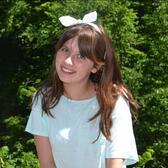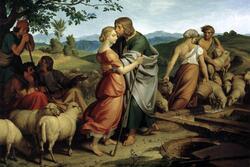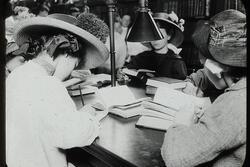The Rebel Women of Passover
My grandfather starts every Pesach Seder with the same opening lines. He talks about how he can remember being at the Seder table with his grandfather, who was once at a Seder table with his grandfather, and if you follow the generations back only a few more times you are right back at the original Pesach celebration, the escape from Egypt. These few words add so much meaning to my Pesach experience; I feel a direct relation to the Jews who escaped slavery so long ago. But while I love being able to draw this connection to the ancient past, something has always struck me about this tale: how come women are not part of this story of family linkage?
When it first dawned on me a few years ago, I couldn’t foresee what this realization would lead to. I thought about my huge family Seder that happens twice a year on Pesach. Each Seder, my family rotates the household in which the event takes place, and each year, a male in the household has led the Seder.
Leading our Seder is a big deal. You have to make sure all forty or so guests know what page we’re on, delegate speaking parts for the reading aloud of maggid, and keep the kids interested. When I asked my dad if a female could lead the next one, he told me, “The next one that’s at our house is all yours.”
The next year, he kept his word. At fifteen years old, I was the first woman in my family to lead a Seder – and I had a great time. I wrote out song lyrics that had to do with Pesach, and we sung them to familiar tunes. At the start of the meal, I passed around a bag in which there were dozens of tiny slips of paper – each with a small “job” or seder role printed on them so that every person would know when it was his or her turn to help out. I made a questionnaire that I passed out at the beginning of the meal: Which of the four children are you? This was intended to provide psychological insight into different personalities and inspire self-reflection in the setting of our Seder table.
Speaking of the four children, they are not called “children” in our traditional haggadot. The four personalities are sons, boys, male. Pesach, I realized, appears to be a sexist holiday, and a quick flip through the story will reveal that the majority of important characters are male. Moses: the man who leads the Jews out of slavery. Aaron: the powerful, advice-giving older brother. Pharaoh: the dominant King who controls the lives of countless subjects. And the haggadah is filled with tales of Rabbi Eliezer and his fellow rabbinic scholars, men who stayed up all night learning Torah.
When I looked closer, however, I saw that there are, in fact, plenty of women in the story—and almost all of them are rebels. In my ninth-grade chumash class, we labeled them the “rebel women of the Exodus.” Shifra and Puah are midwives, and they are told explicitly by Pharaoh to kill all Jewish baby boys that are born. They are given orders which they directly disobey. Shifra and Puah know they could be killed for doing this; they value this act of rebellion as much as their own lives. Miram, Moses’ sister, risks her life by spying on her brother as he floats down the river. Her mother, Yocheved, risks her life by putting him there in the first place. Bat Paroah, the unnamed daughter of Pharaoh, saves baby Moses from a sure death in the Nile River. She knows her father would be furious with her, yet she does it anyway.
Why did these women risk their lives? What compelled them to rebel against the precedents set for them by the potentate?
A rebel is a person who intentionally does something different from the norm because she has an opinion that is not shared by many others. A rebel stands up against unjust doings. The word “rebel” often has a negative connotation, but it can be used to describe a truly inspiring person. A rebel is someone who does “wrong” because she feels that her actions are right.
The female protagonists in the Pesach story all embody this definition of a “rebel.” They stand up for something they believe in: saving a baby, protecting a life, watching over a sibling.
When I led my Seder last year, I was taking a stand against something I thought wasn’t right. Why shouldn’t a woman get to lead a Seder? No reason at all. And although I was the first woman to officially lead the seder in our family, I realized that many women in my family have been active and strong participants in our family seders.
A huge inspiration to me is my paternal great-grandmother, Savta Miriam. Savta Miriam lives in a senior home in Israel, where she regularly gives shiurim on the parasha and on Jewish topics that interest her, like the history of ketubot and Jewish music. I remember one year, she was in Los Angeles for Pesach, and she had written out the stories of each of the female rebels of the story of the Exodus. She assigned a section to each of her great-granddaughters to read aloud at the seder. I especially remember the piece about Miriam and the strong role she played in the Pesach story. Not just through her saving Moses, but also through her song and dance, Miriam lifted the spirits of the Jewish women and gave them hope to remain joyous as they crossed the threshold into freedom.
I don’t know if it struck me then, but I now appreciate how many empowering qualities that my sagacious Savta Miriam shares with Miriam HaNeviah, Miriam the Prophetess. There have been so many words of Torah and wisdom that Savta Miriam has always shared and continues to share with me and the rest of our family. She has always given us the message that a woman can – and should be – interested in learning and teaching about Judaism.
I am also so lucky that I continue to share my seder table with my maternal great-grandmother, Bobie. At ninety-nine-and-a-half, she continues to be the ultimate example of strength and wisdom. She often shares her love of reading, knowledge of current events, and abundance of wise psychological insights with me. She came to Los Angeles in 1943, before there were many established Jewish communities here. She paved the way for Jewish schools, shuls, and American support groups for Israel. She shares her passion with us for the state of Israel, and recently returned from her fortieth trip there, where the mayor of Jerusalem met with and honored her.
Women are an essential part of the Pesach story. By leading a seder, I am able to follow the paths of these women, emulate the leadership of my two great-grandmothers, and bring the voices of these powerful women into the spotlight. I can represent the women who may seem ancillary and bring them into the forefront of our family seder table.
I look forward to sitting around the seder table with my grandchildren and great-grandchildren one day, sharing the stories of Pesach holidays spent with Savta Miriam and Bobie, and I will use my grandfather’s heartwarming introduction, and talk about how I can remember being at the Seder table with my great-grandmother, who was once at a Seder table with her great-grandmother, and if you follow the generations back only a few more times you are right back at the original Pesach celebration, the escape from Egypt.
This piece was written as part of JWA’s Rising Voices Fellowship.








I enjoyed your article.
Our mother told us as kids (four daughters), that we come from a long line of strong women. I was always proud of that.
I loved reading this with hope for what my children and grandchildren will think about our seders. Coming from a non-religious family and making a decision to raise an observant Shomer Shabbat family hopefully means that my legacy will include more Torah rich families enjoying meaningful seders together for generations to come! Thank you for sharing.
Wonderful - I'm the author of the recent book, Moses: A Stranger among Us, and there are two chapters in the book dedicated to the "rebel women" of the Exodus story. I'm so happy to read about increasing awareness and discussion of their crucial role in the liberation of the Jews from Egypt. Forgive the promotional plug, but you can find the book on all the usual online vendors. Happy Pesach!
So proud of you Eliana - I love you and your entire family! Isn't it great that my Eliana and you have grandmothers - strong women role models living in the same building.
hey how about some kudos to all your male relatives (like this Uncle that is writing you here) who not only supported but endorsed this rebellious move of leading the Seder. We loved it. and not because of any hidden or latent agenda but because the Seder was a transformative, engaging and enlightening experience that was shared by ALL who were there. We are very proud to have been part of such a monumental shift in traditional practice. May your actions inspire others to follow and relieve many males of having to spend countless hours preparing Seders worldwide. Maybe this will inspire men to get back into the Kitchen and grind up some Charoset for once.
In reply to <p>hey how about some kudos by Jason Ciment
Thanks Uncle Jason! I really appreciate your comment :)